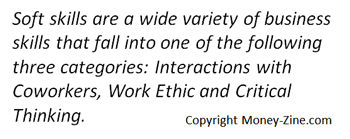Intelligent people can learn the technical skills they need to be successful at work. But individuals looking to climb the corporate ladder need superior soft skills too. Unfortunately, all too often people are promoted to leadership positions that lack the soft skills required to be successful. In this article, we're going to talk about the concept of soft skills. We'll provide a definition of the term, as well as presenting some examples. We'll also talk about the difference between soft and hard skills. Finally, we'll explain how someone can use this information to enrich their resume.
Soft Skills in the Workplace
| Additional Resources |
| Leadership Traits Leadership SkillLeadership Skills Assessment Developing Leadership Skills |
While technical expertise is always appreciated, and something of value, moving up the ranks in the workplace means going beyond being recognized as a subject matter expert, or SME. Soft skills are often what separate individual contributors from managers and business leaders.
Definition of Soft Skills
Soft skills are best defined as the wide variety of business skills that fall into one of the following three categories:
Interactions with Coworkers
Professionalism and / or Work Ethic
Critical Thinking or Problem Solving
Each of these categories can be applied to almost any position in nearly every company. That's one of the reasons so many institutions of higher education offer students the opportunity to develop soft skills as part of their curriculum. In the sections that follow, we're going to expand on this list of soft skills through both examples as well as explanations.
Interactions with Coworkers
This first category of soft skills includes the ability to interact effectively with coworkers and clients. Examples of this category of skills include:
Networking: this is the building of strong relationships or alliances with others. Networking is important in building connections across an enterprise. If someone doesn't know something, it's important they know who can help.
Communication: the effective sharing of information with others - including oral, written, and even non-verbal communication.
Teamwork / Collaboration: the ability to work successfully in a group setting, including assuming the role of a team player. This is someone that puts the goals of the team ahead of their personal goals.
Demonstrating Empathy: the capability to share one's feelings with others, as well as understanding the emotions of others.
Professionalism and / or Work Ethic
This second category of soft skills focuses on how a person conducts himself or herself at work. Examples of this category of skills include:
Professionalism: includes dressing appropriately for the work setting, arriving on time, speaking in a respectful manner to coworkers, customers and clients.
Integrity: acting in a truthful and honest manner. This skill is typically aligned with the values expressed by the company.
Optimism: this person anticipates the best possible outcome, and provides positive feedback when someone is faced with adversity.
Enthusiasm / Motivation: the skill required to remain devoted to, and supportive of, an idea, corporate goal or work assignment. To continue to remain engaged in the pursuit of a goal.
Critical Thinking or Problem Solving
This last category of soft skills deals with one's ability to think critically, and solve problems at work. The ability to pull together data to solve a problem in the workplace is a widely-valued talent in a business setting.

One of the keys to being an effective problem solver is developing the solution to the problem in a reasonable timeframe. It is also important to be able to explain how the solution to a problem was solved in both a logical and systematic manner.
Soft versus Hard Skills
Perhaps the easiest way to differentiate between soft and hard skills can be described in this manner:
Hard skills are those that are easily observed and quantified (perhaps via a scientific test). It's also relatively easy to teach someone a hard skill in a formal classroom setting or using an on-the-job situation. Hard skills include abilities such as working with spreadsheets, operating machinery, speaking a foreign language, or using a personal computer.
Soft skills are sometimes referred to as people skills; and based on the examples provided earlier, they're not easy to quantify, and are sometimes described as intangible. That said, it's often easy to identify a coworker that appears to possess strong soft skills; due to what seems to be their natural ability to work effectively with others.
Soft Skills on a Resume
By now, it should be obvious why a company would value an employee with superior soft skills in addition to the technical expertise they're seeking. Individuals looking to move up or move out of an organization need to highlight these skills on their resumes if they want to separate themselves from the rest of the crowd. Functional and combination style resumes both contain a careers skills / knowledge section, where a bulleted listing or table of the skills and knowledge appear. This section is placed near the beginning of the resume, so it's important to make sure it projects the right image of the applicant's talents.
Resume Example: Soft Skills
The following demonstrates how this section of a resume can highlight a job applicant's soft skills. This particular example lists hard skills on the left hand side of the table and soft on the right:
| CAREER SKILLS / KNOWLEDGE | |||||||||
| Financial Planning and Analysis | Accounting Application Design | Operational Budgeting | Long-term Planning | Capital Budgeting | Problem Solving | Critical Thinking Skills | Training and Development | Interpersonal Skills | Teamwork / Collaboration |
About the Author - Understanding Soft Skills



.jpg)